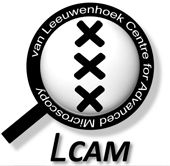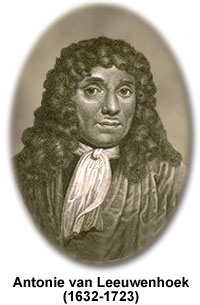Organisers
Van Leeuwenhoek Centre for Advanced Microscopy (LCAM)

The aim of the van Leeuwenhoek Centre for Advanced Microscopy (LCAM) is to boost life sciences research where light microscopy plays a central role. LCAM is a collaboration between Faculty of Science (LCAM-FNWI) of the University of Amsterdam, the Academic Medical Centre (LCAM-AMC) and the Dutch Cancer Institute (LCAM-NKI) in Amsterdam, The Netherlands. The staff of LCAM has the expertise, skills and experience to give professional support and coaching to researchers to use advanced microscopy for their research. LCAM has a complete range of microscopes, image analysis and data storage equipment to facilitate scientific research. LCAM translates biological problems into microscopical solutions.
In addition to support research in the life sciences research, LCAM organizes on a regular basis courses for users who are interested in applying fluorescence microscopy in their research. These courses are given at various levels, starting from high-school, bachelor and master student courses till basic and advanced courses for PhD students, postdocs and other experienced researchers.
Antonie van Leeuwenhoek
 LCAM is named after Antonie Philips van Leeuwenhoek (October 24, 1632 – August 26, 1723) who was a Dutch tradesman and scientist. He is commonly known as “the Father of Microbiology”, and considered to be the first microbiologist. He is best known for his work on the improvement of the microscope and for his contributions towards the establishment of microbiology.
LCAM is named after Antonie Philips van Leeuwenhoek (October 24, 1632 – August 26, 1723) who was a Dutch tradesman and scientist. He is commonly known as “the Father of Microbiology”, and considered to be the first microbiologist. He is best known for his work on the improvement of the microscope and for his contributions towards the establishment of microbiology.
Raised in Delft, Netherlands, Leeuwenhoek worked as a draper in his youth, and founded his own shop in 1654. He made a name for himself in municipal politics, and eventually developed an interest in lensmaking. Using his handcrafted microscopes, he was the first to observe and describe single-celled organisms, which he originally referred to as animalcules, and which are now referred to as microorganisms.
He was also the first to record microscopic observations of muscle fibers, bacteria, spermatozoa, and blood flow in capillaries (small blood vessels). Leeuwenhoek did not author any books; his discoveries came to light through correspondence with the Royal Society, which published his letters. For more info click here.